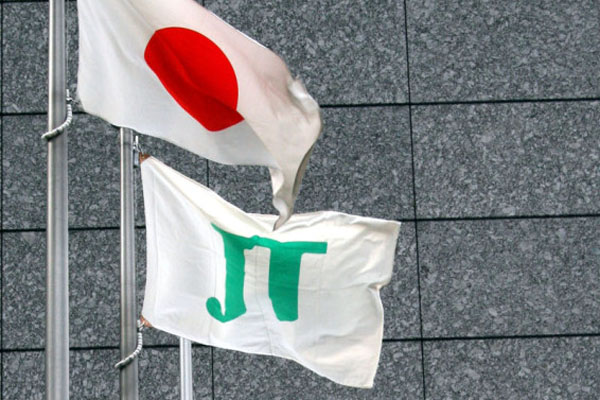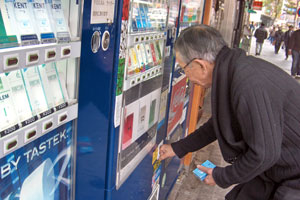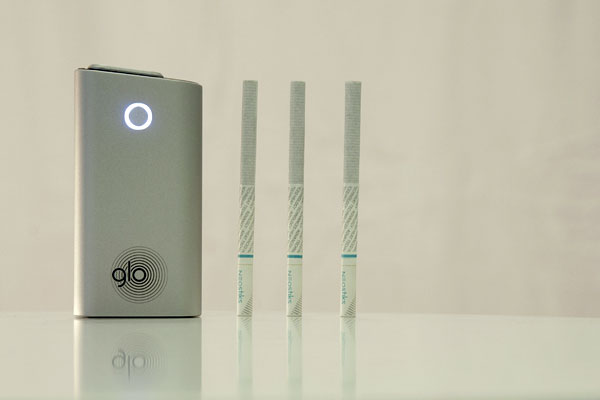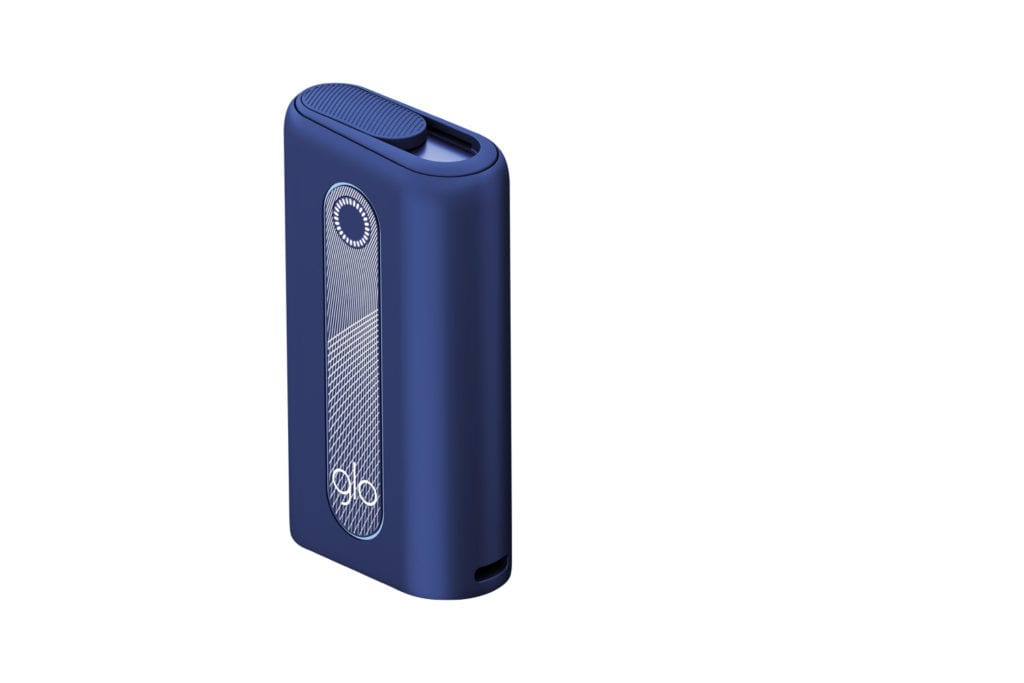Japan Tobacco Inc.’s domestic cigarette sales volume during September, at 9.4 billion, was increased by 24.7 percent on that of September 2017, 7.5 billion, according to preliminary figures issued by the company today. The September 2017 figure was down by 13.6 percent on that of September 2016.
Volume during January-September, at 64.2 billion, was down by 8.7 percent on that of January-September 2017, 70.3 billion. The January-September 2017 volume was down by 11.8 percent on that of January-September 2016.
JT’s market share stood at 63.1 percent during September (up from 62.2 percent in August), at 61.9 percent during January-September, and at 61.3 percent during January-December 2017.
JT’s domestic cigarette revenue during September, at ¥56.2 billion, was increased by 24.8 percent on its September 2017 revenue, ¥45.0 billion, which was down by 13.2 percent on its revenue of September 2016.
Revenue during January-September, at ¥383.0 billion, was down by 8.5 percent on that of January-September 2017, ¥418.6 billion, which was down by 10.3 percent on its revenue of January-September 2016.
Tag: Japan

Cigarette sales leap

JT receives PRIDE award
Japan Tobacco Inc. has received the highest-ranked Gold award from the voluntary organization work with Pride (wwP) as part of Japan’s PRIDE Index 2018, according to a note posted on JT’s website. At the same time, the company has been recognized for its Best Practice by the wwP PRIDE Indicator Steering committee, which has a role in evaluating when the efforts put in by companies and organizations are particularly good.
This year marked the third consecutive year in which JT had been awarded Gold status, and the second consecutive year in which it was recognized for its Best Practice.
The PRIDE index rates the efforts of companies and organizations in five categories based on criteria established by wwP.
Awards are given based on the company’s efforts in the light of each category to create a pleasant workplace for LGBT people across Japan.- Policy (Action Declaration).
- Representation (LGBTA network).
- Inspiration (Raising Awareness).
- Development (Human Resources Management Policy and Programs).
- Engagement/Empowerment (Social Responsibility and External Activities).
JT said in its note that it believed in respecting diversity not only in terms of people’s gender, gender identity, sexual orientation, age, and nationality, but also in respect of their backgrounds and values, including their experiences and expertise.
It said that finding value in differences would lead to sustainable growth for the company. ‘Promoting diversity and inclusion is one of the issues in our management plan,’ it said.
‘JT continues to actively promote diversity in order to achieve sustainable growth through the participation of diverse human resources.’
PMI on track
Philip Morris International and Scuderia Ferrari yesterday entered a new phase in their 45-year partnership with the unveiling of Mission Winnow, a new global initiative to create engagement around the role of science, technology and innovation as a powerful force for good in any industry.
The global initiative is taking to the tracks this week at the Formula 1 2018 Honda Japanese Grand Prix at Suzuka.
“Through Mission Winnow we want to let the world know how we have changed, to share our pride in the transformation that the people of PMI have achieved, as well as our dedication to rigorous science and innovation that can lead to a better future,” said André Calantzopoulos, PMI’s CEO.
“We will use this global platform as a window into the new PMI and to challenge preconceptions, as we know there are many who may have doubts about us and our motivations. Our partnership with Scuderia Ferrari gives us the opportunity to build on many encouraging individual conversations with critics and supporters alike and reach out to a broad audience to engage at scale.”
‘The word “winnow” (pronounced: “win”– “oh”) was selected because it perfectly describes the meticulous and disciplined route that PMI is following to achieve its ambitious vision of a smoke-free future,’ PMI said in a note posted on its website. ‘The word – and PMI’s vision – is about focus, transparency, care and single-minded determination.
‘”Winnow” originally referred to the removal of chaff from grain, but it came to be used more broadly to describe the separating out of the unnecessary, the extraction of the good and distinguishing what is true from what is inaccurate or misleading. For PMI, this is critically important in a world of information overload.
‘The company also believes it is critically important to adhere to an uncompromising commitment of continuous improvement through the dedicated and diligent pursuit of scientific and engineering excellence with an intense focus on details. This commitment and focus are creating a paradigm shift in the tobacco industry toward a better future.’
“Mission Winnow encapsulates our commitment to strive for better in everything we do,” said Calantzopoulos. “To winnow, or to discard old approaches, is what we at PMI are doing – we take learnings from past mistakes to shape our future.”
PMI said in its note that, in driving toward the future, it had chosen a path that was in all aspects very complex and faced many challenges. Like Scuderia Ferrari, the company had set a course forward, and there was no turning back: PMI had to progress constantly and rapidly, examining and analyzing the way ahead by learning every day and adjusting to improve at the next corner.
“Mission Winnow is about how we are transforming as a company, what we believe in and the way we work to enable a better future,” said Miroslaw Zielinski, president science and innovation at PMI. “Scuderia Ferrari is the ideal partner for Mission Winnow because of the team’s passion for innovation and drive to constantly improve in the quest for victory.
“We are launching Mission Winnow in the F1 circuit because motorsport fans understand there is no reverse gear in racing, only forward thinking and we believe they will want to share this vision.”
PMI said that Mission Winnow provided an insider’s view of two companies that operated in very different fields but had a great deal in common. ‘For both companies, success hinges on the passion of their people for the highest standards of performance in pursuit of overarching ambitions,’ it said. ‘Mission Winnow does not and will never advertise or promote any tobacco products. Mission Winnow is not about what, it is about how and why.
More information on Mission Winnow is at: www.missionwinnow.com or @missionwinnow on Facebook, Instagram and Twitter.
No tobacco contamination
Japanese Burley has been given the all-clear.
Japan Tobacco Inc. has been conducting pre-purchase tests for radioactive materials in Japanese domestic leaf tobacco since the accident at the TEPCO Fukushima Daiichi nuclear plant in 2011.
Other tests have been carried out at each stage of its production process.
‘Prior to this year’s Japanese domestic tobacco harvest, the company has again been conducting radioactive material testing on leaf tobacco before purchase, with the support of tobacco growers,’ JT said in a note posted on its website.
‘Testing of this year’s Burley have now been completed, showing none of the leaf tobacco tested exceeded the JT standard value (Radioactive cesium: 100 Bq/kg).
‘Furthermore, JT will continue with its scheme of testing domestic leaf tobacco after purchase, and testing and monitoring a number of times at each stage of the production process.
The pre-purchase tests were carried out on 24 samples from the Tochigi, Fukushima, and Miyagi prefectures by the company’s research centre using ORTEC germanium semi-conductor detectors.
Air quality little affected
Japan Tobacco Inc. says that non-combustible T-Vapor products should be treated differently to combustible cigarettes when looking at issues surrounding indoor air quality. JT sees the reduced-risk product market as comprising several categories, one of which is the T-Vapor, or Heated Tobacco and Tobacco Infused-Vapor category.
In a note posted on its website, JT said it had conducted a study to observe the effects of T-Vapor products on indoor air quality in the designated smoking room and the non-smoking area of a restaurant in Tokyo, Japan, and that it had found:- No significant increases in the concentration of suspended particulate matter, nicotine or other constituents monitored in the non-smoking area of the restaurant.
- That the use of T-Vapor products in the designated smoking room with door and common ventilation facilities had no effects on the indoor air quality in the non-smoking area.
The study, which was said to have used combustible cigarettes and two types of T-Vapor products, was supervised by Professor Emeritus Keiichi Arashidani, of the University of Occupational and Environmental Health, Japan, and carried out last month in the designated smoking room and the non-smoking area of a typical restaurant in Tokyo.
The study measured 15 air constituents, including items defined in the act on Maintenance of Sanitation in Buildings: suspended particulate matter, carbon monoxide and formaldehyde; indicators of indoor air quality: TVOC(total volatile organic compounds); VOC (volatile organic compounds): 1,3-butadiene, isoprene, benzene and toluene; carbonyls: acetaldehyde, acrolein and crotonaldehyde; marker compounds of environmental tobacco smoke: 3-ethenylpyridine and nicotine; and major ingredients of T-Vapor products: propylene glycol, glycerin.
JT said that the study results showed that the use of T-vapor products in designated smoking rooms did not affect indoor air quality in the non-smoking areas under the study conditions.
‘We believe that designated smoking rooms for T-Vapor products with door and common ventilation facility have no effects on indoor air quality in non-smoking area,’ it said.
Fall in sales falling
Japan Tobacco Inc.’s domestic cigarette sales volume during August, at 7.3 billion, was down by 9.4 percent on that of August 2017, 8.1 billion, according to preliminary figures issued by the company today. The August 2017 figure was down by 13.0 percent on that of August 2016.
Volume during January-August, at 54.8 billion, was down by 12.8 percent on that of January-August 2017, 62.8 billion. The January-August 2017 volume was down by 11.6 percent on that of January-August 2016.
JT’s market share stood at 62.2 percent during August (up from 62.1 percent in July), at 61.7 percent during January-August, and at 61.3 percent during January-December 2017.
JT’s domestic cigarette revenue during August, at ¥43.8 billion, was down by 9.4 percent on its August 2017 revenue, ¥48.3 billion, which was down by 12.7 percent on its revenue of August 2016.
Revenue during January-August, at ¥326.8.0 billion, was down by 12.5 percent on that of January-August 2017, ¥373.7 billion, which was down by 9.9 percent on its revenue of January-August 2016.
JT's domestic sales falling
Japan Tobacco Inc.’s domestic cigarette sales volume during July, at 7.1 billion, was down by 10.2 percent on that of July 2017, 7.9 billion, according to preliminary figures issued by the company today. The July 2017 figure was down by 12.4 percent on that of July 2016.
Volume during January-July, at 47.4 billion, was down by 13.3 percent on that of January-July 2017, 54.7 billion. The January-July 2017 volume was down by 11.3 percent on that of January-July 2016.
JT’s market share stood at 62.1 percent during July (up from 61.9 percent in June), at 61.6 percent during January-July, and at 61.3 percent during January-December 2017.
JT’s domestic cigarette revenue during July, at ¥41.7 billion, was down by 10.9 percent on its July 2017 revenue, ¥46.9 billion, which was down by 12.2 percent on its revenue of July 2016.
Revenue during January-July, at ¥283.0 billion, was down by 13.0 percent on that of January-July 2017, ¥325.3 billion, which was down by 9.5 percent on its revenue of January-July 2016.
Smokers to pay the price
In announcing that it had applied to increase the retail prices of its tobacco products, Japan Tobacco Inc. said today that declining sales made it difficult to maintain quality and services with cost reductions alone.
JT said it had applied to the Minister of Finance for approval to ‘amend’ retail prices of tobacco products in Japan in conjunction with a planned tobacco-excise-tax hike on October 1.
JT said it had applied to increase the retail prices of 143 products, including 122 cigarettes, one cigarillo, three pipe tobaccos, three cut tobaccos and 14 snuff tobaccos. Additionally, it said it had applied for seven Ploom TECH product price rises in the tobacco vapor category.
‘The Japanese domestic tobacco market continues to experience decreasing sales volumes due to structural factors including the aging and declining adult population, as well as increasingly stringent smoking restrictions,’ the company said in a note posted on its website. ‘At the same time the cost per pack for providing the same quality and services has been increasing. Under these circumstances, JT had been maintaining the quality and price levels through cost reducing efforts.
‘However, since JT is projecting a further sales volume decline, it is very difficult to maintain the same quality and services with cost reduction initiatives alone. In this context, JT has applied to amend the retail prices of cigarettes, which exceeds the excise tax hike of ¥1.0 per cigarette, considering further increases in costs including materials. Retail price increases will vary among different brands and products, to ensure that the quality of each product will be maintained and that consumer expectations continue to be met.’
JT added that, within the tobacco vapor category, a new tax system would be imposed in stages over a five-year period. JT said it had decided to apply a ¥30 increase to the retail price of Ploom TECH, whose tax was expected to be increased by ¥30.89 a pack.
A table of representative brands presented in the note indicated that the retail price of a pack of Mevius cigarettes would rise by ¥40 to ¥480, while the price of Winston and Hi-Lite would increase by ¥30 to 450, and the price of Hope would go up by ¥20 to ¥250.
‘New retail prices will be effective on October 1, 2018, following the Minister of Finance’s approval,’ JT said.
Acquisitions lift volume
Japan Tobacco Inc. reported today that second-quarter domestic cigarette sales, at 20.8 billion, were down by 12.6 percent on those of the second quarter of 2017, 23.8 billion.
At the same time, industry volume was said to have been down by 13.4 percent from 33.8 billion to 39.1 billion.
JT said that its volume and that of the industry had been affected mainly by the expansion of the reduced-risk-product category and a continuing market decline.
The company estimates that sales of reduced-risk products (RRPs) in Japan during the second quarter accounted for about 20 percent of the total tobacco industry volume, a share that was up slightly from that of the first quarter.
During the second quarter of this year, sales of JT’s RRPs amounted to 0.5 billion cigarette equivalent units. ‘Based on sales volume, our share within the RRP category in the quarter was estimated at approximately 10 percent in convenience stores where our product was available,’ JT said in announcing its results for the second quarter and first half. ‘Ploom TECH’s nationwide roll-out started in June and expanded to convenience stores in July.’
JT’s market share during the second quarter, at 61.6 percent, was said to have been 0.6 of a percentage point higher than during the second quarter of 2017 and 0.2 of a percentage point higher than it was during the first quarter of this year.
Core revenue for the domestic tobacco business fell by 5.1 per cent to ¥142.9 billion and adjusted operating profit was down by 13.1 percent to ¥54.6 billion.
Meanwhile, Japan Tobacco International’s total shipment volume during the second quarter, at 107.3 billion, was increased by 5.6 percent on that of the second quarter of 2017, 101.5 billion.
At the same time, JTI’s Global Flagship Brand (GFB) shipment volume was increased by 0.8 percent to 68.1 billion.
JT reported that JTI’s volume growth had been driven by acquisitions in Ethiopia, Indonesia and the Philippines. ‘Excluding acquisitions and unfavorable inventory adjustments, total shipment volume declined 0.5 percent,’ the company said. ‘Quarterly volume increases and market share gains in Austria, Czech Republic, Germany, Hungary, Iran, the Netherlands, Poland, Switzerland and several emerging markets did not offset the impact of industry volume contraction, notably in France, Russia and Taiwan. GFB shipment volume increased 0.8 percent, growing in North and Central Europe and Rest-of-the-World, driven by Winston.’
JTI’s core revenue increased by 8.0 percent to ¥325.2 billion, while adjusted operating profit rose by 14.4 percent to ¥103.2 billion.
“Our first half results demonstrate a solid performance and we remain on track to achieve our consolidated full year profit target,” said Masamichi Terabatake, president and CEO of the JT Group.
“The international tobacco business delivered strong profit growth, led by pricing in key markets.
“We are confident about reaching our full year profit target as we expect our positive performance to continue into the second half.
“The acquisition of Donskoy Tabak companies will reinforce our No.1 position in Russia, a long-term key market for the Group’s earnings growth.
“In the Japanese domestic tobacco business, cigarette market share gains continued led by the robust performance of MEVIUS.
“Our RRP sales volume and revenue grew following an encouraging start of Ploom TECH’s nationwide roll-out while our capsule manufacturing capacity has continued to improve as planned. Although the current growth of the RRP market is slowing down, we believe that its market share could expand to 30 percent by 2020 driven by industry-wide innovations, an area in which we have also been making progress. To this effect, we are accelerating our investments in RRP initiatives, especially behind Ploom TECH, our unique offering, to establish the low-temperature heating category.”









